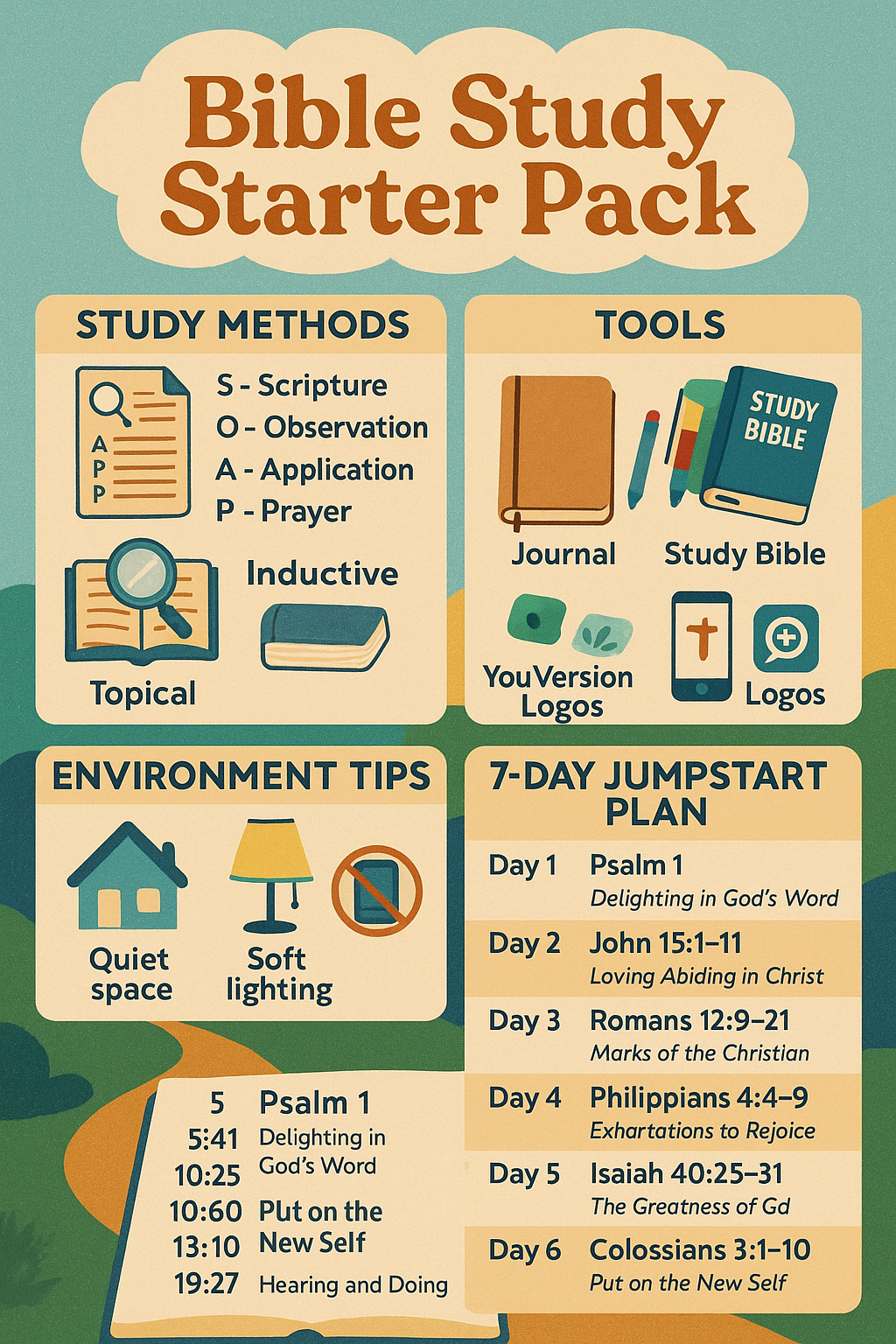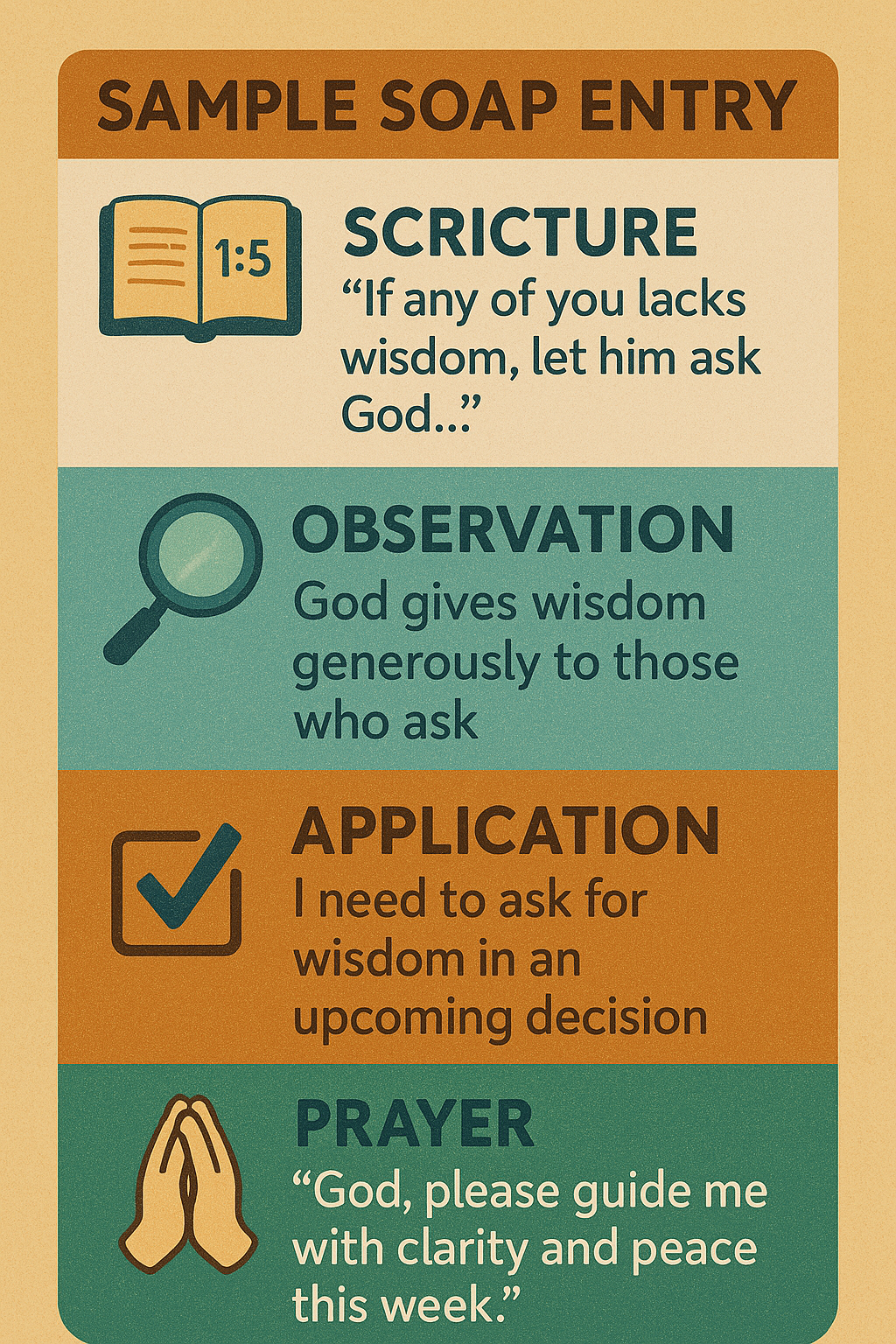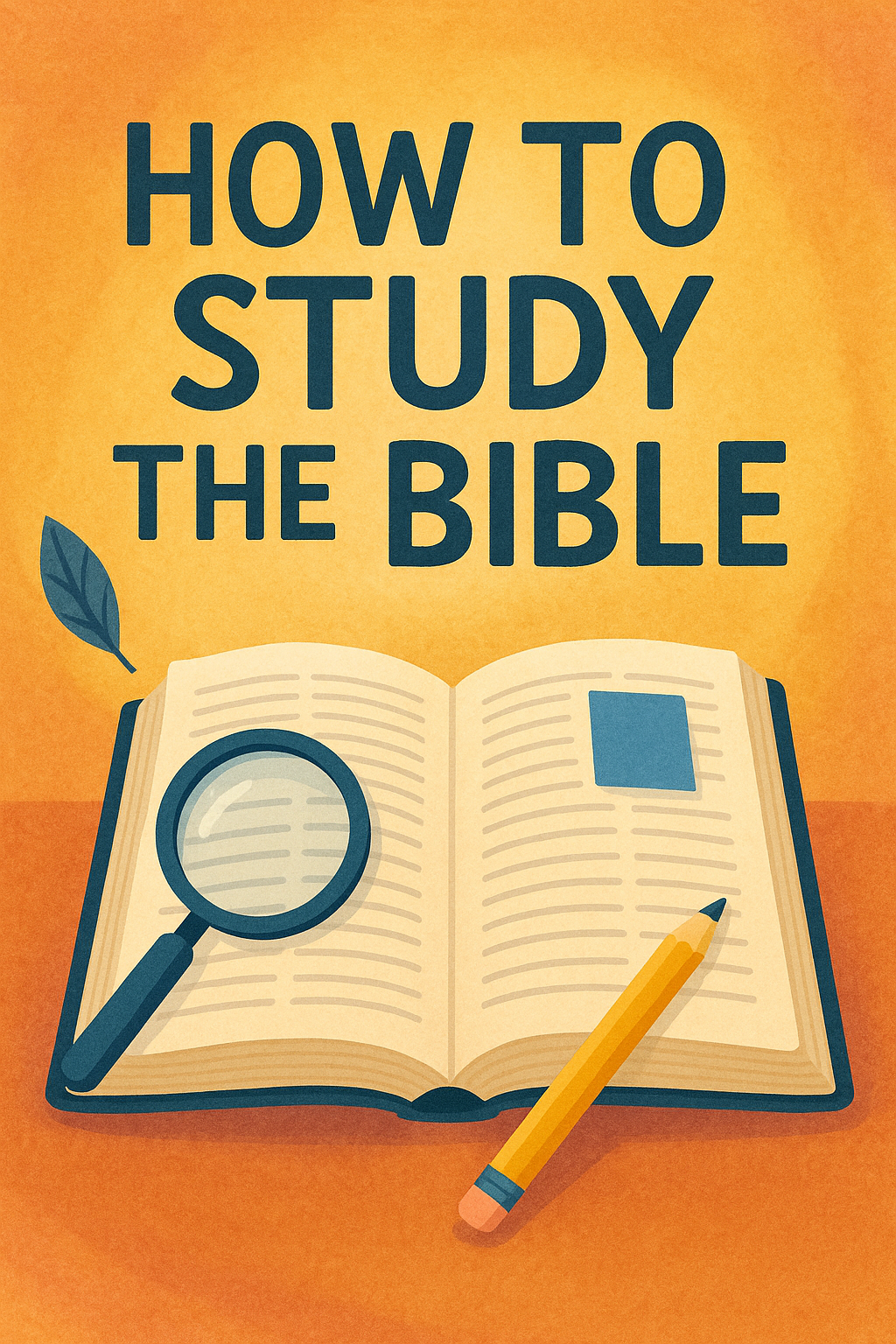Quick Answer: To study the Bible effectively, choose a specific book (like John or Proverbs), pray for guidance, and read it slowly and thoughtfully. Use proven frameworks like SOAP (Scripture, Observation, Application, Prayer) or Inductive Study to deepen your understanding. Consistency matters more than speed — start with small portions, journal your insights, and let the Holy Spirit guide your interpretation.
How to Study the Bible
Whether you’re cracking open a Bible for the very first time or picking it up again after years, one thing’s for sure — it can feel a bit intimidating. With 66 books, complex names, and centuries of history behind it, the Bible isn’t always easy to navigate. You might wonder:
- Where do I start?
- What if I don’t understand it?
- Do I need to know Greek or Hebrew to really “get” it?

The good news? You don’t need to be a scholar or pastor to experience the Bible in a deep, personal, and transformative way.
Here’s the unique truth: What you do need is a clear structure, a willing heart, and some simple tools. With a focused method, regular prayer, and a commitment to consistency, anyone — student, parent, entrepreneur, retiree — can study the Bible and hear God speak through its pages.
Related:
How to Improve Concentration?
How to Study Effectively?
Step-by-Step Guide to Studying the Bible by Yourself
1. Choose a Bible Translation That’s Right for You
Not all Bible translations are created equal — some are word-for-word, while others are more thought-for-thought or paraphrased. Choosing the right one makes a huge difference in how easily you understand and engage with the text.
Beginner-friendly translations:
- NIV (New International Version): Balanced, readable, great for study
- NLT (New Living Translation): Very accessible, conversational tone
- CSB (Christian Standard Bible): Accurate but still smooth
- Avoid for now: KJV (too archaic), NASB (very literal and technical)
Pro Tip: Use a Bible app that lets you compare translations side by side. YouVersion is a great free option.
2. Start Small — Pick a Book, Not the Whole Bible
Trying to read the Bible cover-to-cover is admirable, but for most beginners, it’s like drinking from a firehose. Instead, begin with one book and study it slowly.
Best books to start with:
- John (to understand Jesus)
- Proverbs (practical wisdom for daily life)
- James (short, action-focused, very relatable)
- Psalms (if you’re looking for emotional and spiritual connection)
Why start small?
- Builds confidence
- Reduces overwhelm
- Encourages consistency over burnout
Remember: It’s not about how much you read — it’s about how much you absorb.
3. Set a Consistent Time and Place
Consistency builds habit, and habit builds transformation.
Tips for setting your Bible study routine:
- Pick a time: Early morning or bedtime are best for quiet reflection
- Create a space: A cozy corner, desk, or even your car during lunch
- Minimize distractions: Silence your phone, use noise-canceling headphones if needed
Idea: Make your space feel sacred — a candle, warm drink, or calming music can make a difference.
4. Use a Bible Study Method That Works for You
Not everyone learns the same way — and that’s okay. Some people enjoy journaling, some prefer structure, and others love diving deep into theological meaning. The key is to pick a Bible study method that resonates with you and keeps you engaged. Here are three widely respected approaches:
SOAP Method (Simple and Reflective):
- Scripture: Choose a verse or short passage that stands out.
- Observation: What do you notice? Who is speaking? What is being emphasized?
- Application: What does this passage mean for your life right now?
- Prayer: Close with a short prayer, asking God to help you live it out.
SOAP is great for daily devotionals, journaling, or starting your mornings with clarity and intention.
Inductive Bible Study (In-Depth and Analytical):
- Observation: What does the passage literally say? What’s the context?
- Interpretation: What did it mean to the original audience? What spiritual truth does it convey?
- Application: How does this truth apply to your circumstances today?
This method is ideal for those who enjoy logic, structure, and deeper scriptural insight.
Topical Study (Theme-Based Exploration):
- Choose a topic like love, justice, grace, or leadership.
- Use a concordance or Bible app to find every verse related to that topic.
- Read them in their full context and take notes on patterns, commands, or promises.
Topical studies are powerful when you’re facing a specific situation in life or seeking biblical clarity on a particular issue.
“The Bible is not just meant to be read — it’s meant to read you.”
5. Ask Reflective Questions as You Read
Reading the Bible is not just about gaining knowledge — it’s about transformation. The more you ask honest questions while reading, the more personal and powerful your study becomes.
Here are three guiding questions to use every time you study:
- What does this say about God?
Does it reveal His character, promises, actions, or expectations? - What does this say about me?
Are there behaviors to model, sins to avoid, or truths to accept? - How can I apply this today?
Is there one thing I can do, say, or think differently because of this passage?
Answering these questions helps bridge the gap between Scripture and real life. It’s how the Bible becomes more than words — it becomes wisdom you can walk with.
Related:
How to Increase Your Focus?
The Most Popular Bible Study Methods (With Pros and Use-Cases)
With so many Bible study methods available, it’s easy to feel overwhelmed. The key is to pick a method that matches your learning style, your spiritual needs, and the amount of time you can realistically commit. Below are three of the most effective and widely used approaches, each with its own strengths and ideal use cases.
SOAP Method (Great for Daily Devotionals)
The SOAP method is a go-to favorite for those who want a simple yet powerful way to connect with Scripture every day. It’s especially useful for people who enjoy journaling and want a structured way to reflect.
Why it works:
- Easy to remember and apply
- Helps turn reading into actionable reflection
- Encourages consistent prayer and application
Use this when:
- You’re doing a short daily quiet time
- You want to track spiritual growth over time
- You’re new to Bible study and looking for a repeatable framework
Suggested tool: A notebook or journaling Bible where you can write your SOAP entries.

Inductive Bible Study (For Deep Thinkers)
This method goes beyond the surface and invites you to explore the original context, language, and theological implications of a passage. It’s excellent for people who like to analyze, cross-reference, and take their time with interpretation.
Why it works:
- Focuses on deep understanding and context
- Helps avoid misinterpretation by emphasizing original meaning
- Encourages thoughtful application rooted in truth
Use this when:
- You’re preparing to teach or lead a Bible discussion
- You want to understand the cultural and historical background
- You’re comfortable using study tools like concordances, commentaries, or Greek/Hebrew dictionaries
Suggested approach: Use websites like BlueLetterBible or Logos Bible Software for word studies and cross-references.
The 5 P’s of Bible Study
Designed as a holistic framework, the 5 P’s method walks you through a full-circle engagement with Scripture — from intention to life transformation. It’s ideal for those who want to go deeper than a daily devotional but don’t need the depth of a full inductive study.
The 5 P’s explained:
- Purpose – What is the passage’s main intent?
- Perspective – How does it fit into the broader biblical story?
- Process – What is happening verse by verse?
- Prayer – How can I invite God into this moment of learning?
- Practice – What changes should I make in light of this passage?
Why it works:
- Offers a well-rounded, layered approach
- Brings together personal devotion and biblical literacy
- Encourages long-term transformation, not just inspiration
Use this when:
- You’re leading a group or mentoring someone
- You’re ready to go beyond basic study habits
- You want a consistent framework that encourages growth over time
How to Retain and Apply What You Learn
Studying the Bible is powerful — but the real transformation happens when you remember what you’ve read and live it out daily. The most effective Bible learners aren’t just readers; they’re reflectors and doers. Here are three strategies to help you retain Scripture and apply it to your everyday life.
Use a Bible Journal or App
Taking notes is one of the simplest but most powerful ways to deepen your understanding. Whether you prefer writing by hand or typing into an app, the act of recording your thoughts helps reinforce what you’re learning.
Best tools for digital study:
- YouVersion: Great for reading plans, verse highlights, and daily streaks
- Logos Bible Software: Ideal for deep theological research and cross-referencing
- Dwell: An audio-based app for hearing Scripture in calming, curated voices
Why journaling matters:
- Slows you down to reflect
- Creates a record of spiritual growth
- Helps identify patterns and personal themes in your reading
If you prefer physical tools, grab a dedicated notebook or journaling Bible to write out verses, prayers, and key takeaways. The tactile process of writing helps lock things in.
Share Insights With Others
Bible study doesn’t need to be a solo journey. When you discuss what you’ve learned, you gain new perspectives and reinforce your understanding through conversation.
Ways to share:
- Start or join a small Bible study group (in-person or online)
- Share weekly takeaways with a friend or accountability partner
- Post thoughtful reflections in a private journal or even on social media
Why it works:
- Talking about Scripture increases clarity and recall
- Others may share insights you hadn’t considered
- Builds spiritual community and encouragement
When you teach or explain something to someone else, you remember it better yourself.
Memorize Scripture Strategically
Memorization may feel old school, but it remains one of the most effective ways to internalize truth. Instead of randomly picking verses, focus on passages that directly relate to your current season of life or personal growth goals.
How to do it effectively:
- Choose one verse per week and write it out daily
- Place verse cards in visible spots (bathroom mirror, phone wallpaper, dashboard)
- Recite aloud during walks, workouts, or commutes
- Use apps like Bible Memory, Verses, or Fighter Verses for guided memorization plans
Start with impactful verses:
- Romans 8:28
- Proverbs 3:5–6
- Philippians 4:6–7
- Psalm 119:11
Memorized Scripture becomes a spiritual anchor in times of stress, temptation, or decision-making.
For more info visit this.
How to Pray Before and After Studying the Bible
Prayer isn’t just a spiritual formality — it’s what transforms Bible study from information gathering into a personal encounter with God. Whether you’re new to prayer or familiar with it, taking just a moment before and after your study time can focus your heart, sharpen your mind, and invite the Holy Spirit to guide your understanding.
Sample Opening Prayer
Before you begin, invite God into the moment. This centers your attention and aligns your study with His purpose.
“Lord, open my eyes to see Your truth and apply it to my life.”
You can personalize this by adding your current concerns or intentions. For example:
“God, help me focus today and show me something I’ve never seen before.”
Sample Closing Prayer
After reading, take a few seconds to reflect and respond. This helps seal the Word in your heart and prompts practical action.
“Thank You for Your Word. Help me live it out today in grace and truth.”
You might also say:
“God, remind me of this truth when I face challenges later today. Give me strength to walk in it.”
Micro-Strategy: Write Your Own 3-Line Prayer
To make prayer a habit, create a simple, repeatable format you use daily — a kind of “anchor prayer” that connects your heart to your study routine.
Example Framework:
- Gratitude – “Thank You for the chance to slow down and learn.”
- Focus – “Help me understand what You’re saying in this passage.”
- Action – “Show me how to live this out in my words and choices today.”
Writing and repeating a personalized three-line prayer helps build consistency and intimacy with God over time.
Common Pitfalls to Avoid
Even with the best intentions, it’s easy to fall into habits that make Bible study feel stale, frustrating, or disconnected. Awareness is half the battle — once you know what to avoid, you can build a more life-giving, sustainable rhythm of Scripture engagement.
Don’t Chase Volume Over Understanding
Reading large chunks of Scripture quickly might feel productive, but it often leads to shallow retention. The goal isn’t to “get through” the Bible — it’s to let the Bible get through you.
What to do instead:
- Slow down. Study one passage deeply instead of skimming five chapters.
- Reread the same passage for several days to discover deeper layers.
- Quality > quantity — a single verse can transform your week.
Avoid Cherry-Picking Verses Without Context
Quoting isolated verses without understanding the surrounding context can lead to misunderstanding or misapplying God’s Word.
How to stay grounded:
- Always read a few verses before and after your chosen verse.
- Ask: Who is speaking? Who are they speaking to? Why was this written?
- Use a study Bible or Bible app with commentary for clarity when unsure.
Understanding context honors the text and leads to more accurate life application.
Don’t Study in Isolation Forever
While solo study builds discipline and intimacy with God, Scripture was never meant to be a private experience only. It was written to shape communities — not just individuals.
How to invite others into your journey:
- Join or start a small group that meets weekly
- Share your insights with a trusted friend
- Ask others what they’re learning in their own study time
Community creates accountability, expands perspective, and makes learning more enriching.
Sample 7-Day Beginner Bible Study Plan
Getting started is often the hardest part. To help you build momentum and confidence, here’s a simple 7-day Bible study plan that walks you through foundational themes like identity, wisdom, faith, and spiritual growth.
Each day includes:
- A suggested reading
- A focus theme to reflect on
- A prayer prompt to guide your response
| Day | Reading | Focus Theme | Prayer Prompt |
|---|---|---|---|
| Day 1 | John 1 | Who is Jesus? | “Help me see who You really are.” |
| Day 2 | Psalm 1 | The power of God’s Word | “Plant me deeply in Your truth today.” |
| Day 3 | James 1 | Faith in action | “Give me wisdom and help me act on it.” |
| Day 4 | Proverbs 3:1–12 | Trust and guidance | “Teach me to lean on You, not myself.” |
| Day 5 | John 3 | Salvation and new life | “Remind me that I am loved and forgiven.” |
| Day 6 | Psalm 23 | God’s presence and peace | “Be my Shepherd in every situation.” |
| Day 7 | Romans 8 | Life in the Spirit | “Help me live free and confidently today.” |
How to use this plan:
- Spend 10–20 minutes per day reading, reflecting, and praying
- Use the SOAP or Inductive method to structure your study
- Journal your insights and track any verses or ideas that stand out
- At the end of the week, review your notes and notice any themes God is highlighting
This plan is just a starting point — customize it, expand it, or repeat it as needed. The goal is not perfection, but presence.
Frequently Asked Questions
These are some of the most common questions people ask when starting their Bible study journey. Each answer is designed to be clear, helpful, and actionable.
How do I study the Bible by myself?
Start by choosing a book of the Bible, such as John or Psalms. Pick a translation that’s easy to understand (like NIV or NLT), and set aside a consistent time each day. Use a method like SOAP (Scripture, Observation, Application, Prayer) to reflect deeply, and pray before and after you read. Keep a journal to write down key takeaways and questions.
What are the 5 P’s of Bible Study?
The 5 P’s stand for:
- Purpose – Understand the main point of the passage
- Perspective – See how it fits into the larger biblical story
- Process – Break the passage down logically
- Prayer – Ask God for insight and application
- Practice – Live out what you’ve learned in your daily life
This method is especially useful for consistent spiritual growth and group studies.
In what order should the Bible be studied?
There’s no one “correct” order, but here’s a recommended path for beginners:
- Start with John to understand who Jesus is
- Move to Genesis to learn about creation and God’s covenant
- Explore Psalms and Proverbs for emotional connection and wisdom
- Read Acts and Romans to understand the early church and core Christian beliefs
Focus on one book at a time, and let each build your understanding.
How do I start my first Bible study?
Choose a quiet place and a short, readable book (like James or 1 John). Use a Bible study method such as SOAP or the 5 P’s. Begin with prayer, read slowly, and take notes. Don’t try to rush through — your goal is to reflect, not race.
How to properly pray to God before Bible study?
Keep it simple and sincere. Ask God to help you focus, understand His Word, and apply it. A sample opening prayer could be:
“Lord, open my heart and mind to Your truth. Help me see what You want to show me today.”
Conclusion
Studying the Bible doesn’t require perfection, a seminary degree, or hours of free time each day. It simply requires intentionality, consistency, and a heart that’s open to learning. Whether you choose the SOAP method, dive deep with inductive study, or explore topical themes, the most important thing is to start.
Remember, the goal isn’t to master the Bible — it’s to let the Bible shape you.
So take a breath. Pick a passage. Say a short prayer. Open your journal. And begin your conversation with God.

